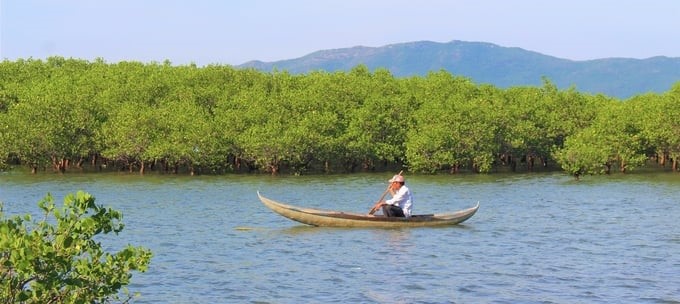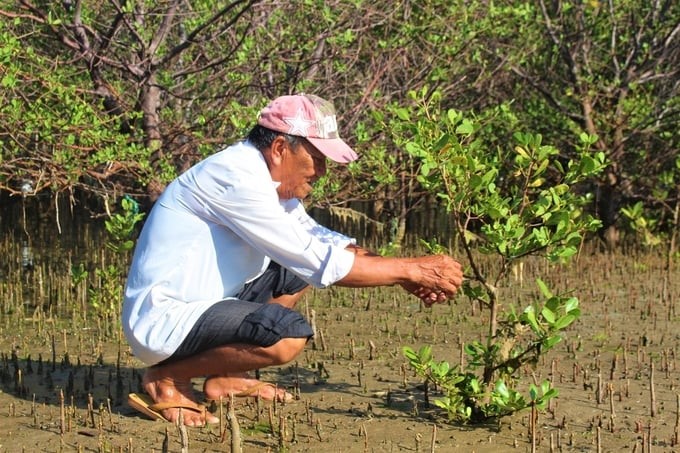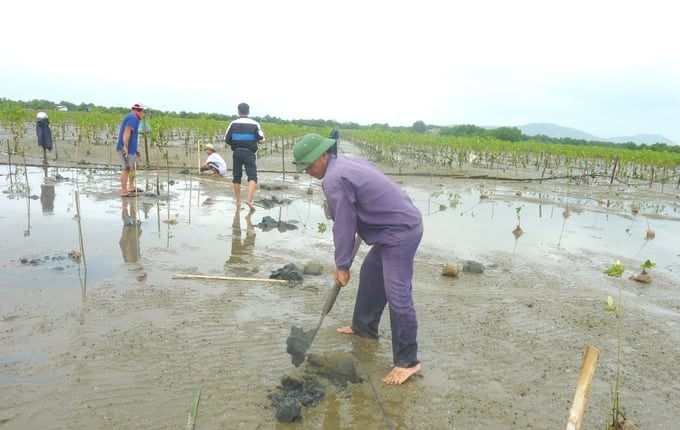November 27, 2025 | 11:40 GMT +7
November 27, 2025 | 11:40 GMT +7
Hotline: 0913.378.918
November 27, 2025 | 11:40 GMT +7
Hotline: 0913.378.918
Binh Dinh is one of three provinces selected by the United Nations Development Programme (UNDP) to implement the project "Smart Coastal Communities Adapting to Climate Change in Vietnam".
According to Mr. Dao Viet Long, Director of the Center for Fisheries Community Development under the Vietnam Institute of Fisheries Economics and Planning (Ministry of Agriculture and Rural Development), the project "Smart Coastal Communities Adapting to Climate Change in Vietnam" will contribute to enhancing resilience to climate change for coastal communities, enriching Vietnam's marine and coastal biodiversity resources.
The project implements empowerment for coastal communities, especially women. Thereby promoting the application of nature-based solutions to adapt to climate change in order to enhance the sustainable management and use of coastal resources and protect the biodiversity of mangrove ecosystems and coral reefs.

People living along Thi Nai lagoon (Tuy Phuoc district, Binh Dinh) row Song (a small bamboo boat) to inspect the mangrove forest. Photo: V.D.T.
Binh Dinh's functional sector is preparing many activities to be ready to implement the project, such as: implementing natural disaster risk management and risk planning; and comprehensive financial programs for nature-based climate solutions that are implemented by women-led organizations. Binh Dinh also implements new planting, additional planting and scattered planting of mangrove forests, and restoration of coral reefs. Ocean plastic waste management is implemented by informal scrap collectors, especially women, to reduce plastic pollution from fisheries and other activities.
Mr. Dao Viet Long said that the project "Smart Coastal Communities Adapting to Climate Change in Vietnam" will be implemented from 2023 to 2027 with funding from the Canadian Government. The total cost is 20 million Canadian dollars (nearly VND 355 million). The reason why Binh Dinh was chosen to implement the project is that Binh Dinh has a long coastline of up to 134km, with many coastal communities depending on marine resources.

People living along the coast in Binh Dinh plant mangrove forests. Photo: V.D.T.
Binh Dinh has successfully implemented many of UNDP’s projects in recent times. In particular, local government and people have made great contributions to preserving biodiversity. In addition, officials and people at the surveyed sites showed a burning desire and great determination to participate in restoring marine and coastal ecosystems associated with sustainable livelihood development.
According to Director Dao Viet Long, those who directly benefit from the project will be fishermen, small-scale seafood purchasing and processing and natural product trading facilities, tourism managers, aquaculture farmers, and many other groups. The project will bring benefits to poor and near-poor households. Especially households headed by women will be priority beneficiaries.

Binh Dinh coastal people are very determined to participate in restoring marine ecosystems. Photo: V.D.T.
The project will help raise community awareness and encourage all people to participate in responding to climate change and preventing and mitigating natural disasters. The project also helps raise awareness of marine ecosystem protection in coastal communities, especially focusing on women, thereby promoting marine and coastal ecosystem services, adapting to climate change, and preserving biodiversity.
"The project will create opportunities to cooperate, access, and apply new knowledge and good models in marine resource management for management agencies, private organizations, and people. Thanks to implementing the project, people in the benefiting areas will increase their capacity to protect aquatic resources sustainably and protect the environment in the context of coastal ecosystems being declined due to human activities as well as impacts of climate change," Mr. Dao Viet Long shared.

Coastal fishermen are direct beneficiaries of the project "Smart Coastal Communities Adapting to Climate Change". Photo: V.D.T.
According to Mr. Tran Dinh Luan, Director of the Department of Fisheries, when implementing the project, Binh Dinh coastal communities also have the opportunity to change careers to reduce impacts on the sea and enhance protecting aquatic resources sustainably and protecting the marine environment.
“At first, the United Nations Development Programme planned to select five provinces to implement the project "Smart Coastal Communities Adapting to Climate Change in Vietnam", but in the end, only three provinces were selected. Currently, the functional sector is in the process of editing the draft to consult relevant ministries and branches. Once approved by the Prime Minister, the project will be implemented," shared Mr. Tran Dinh Luan, Director of the Department of Fisheries.
Translated by Huyen Vu Thu
/2025/11/26/4909-2-154329_878.jpg)
(VAN) Pearl grouper farming in HDPE cages not only delivers economic efficiency but also contributes to protecting the environment, creating jobs, and promoting marine-based experiential tourism.

(VAN) The model of making a living under the forest canopy through the agroforestry system in Van Son commune, Bac Ninh province, is expected to generate an annual income of approximately VND 30 million/ha.

(VAN) Many enterprises in Can Tho are harnessing natural energy and reducing greenhouse gas emissions in their production processes, thereby contributing to the promotion of a sustainable green transition.
/2025/11/24/3536-2-112800_176.jpg)
(VAN) Dong Nai now has tens of thousands of hectares of forests certified for sustainable management, and this area will continue to be expanded in the coming period.

(VAN) Vinh Ha hamlet (Dai Xuyen commune, Hanoi) is shifting away from small-scale farming as households adopt bioscurity into their breeder chicken models.

(VAN) Heavy rains make aquatic species more vulnerable to disease. Proactive water management and high-tech systems help farmers prevent outbreaks and protect yields.

(VAN) Greenhouses are shifting production mindsets in Binh Lu commune, enabling farmers to ‘weather the sun and rain’ and secure stable vegetable harvests throughout the year.